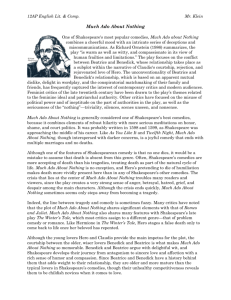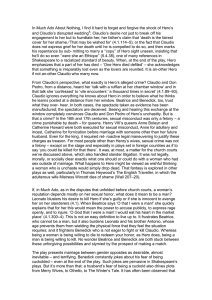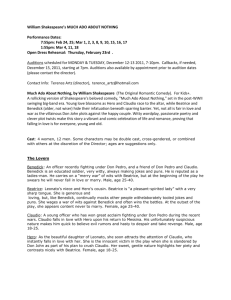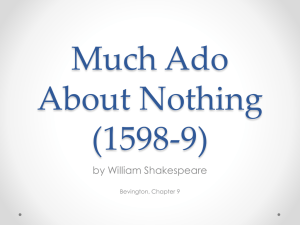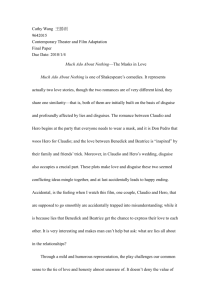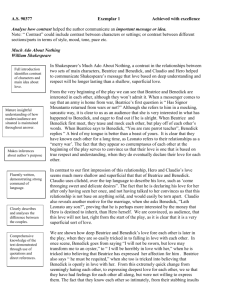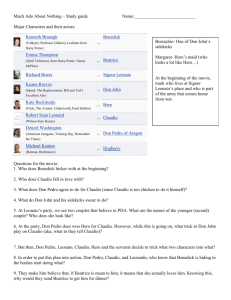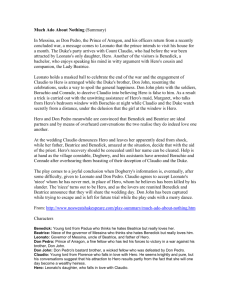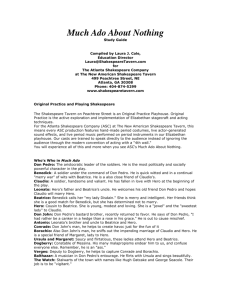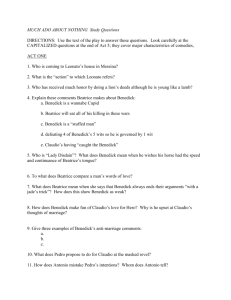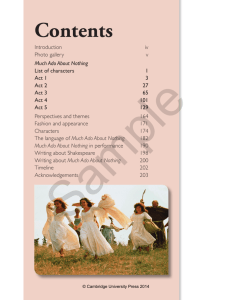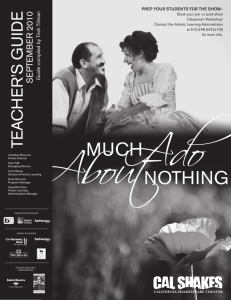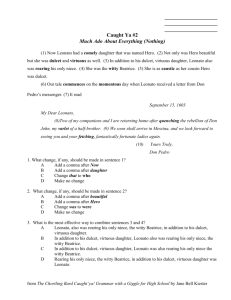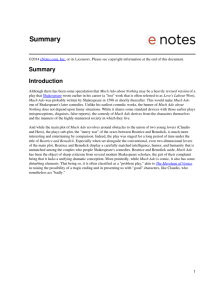Taken from: http://www.sparknotes.com/shakespeare/muchado
advertisement
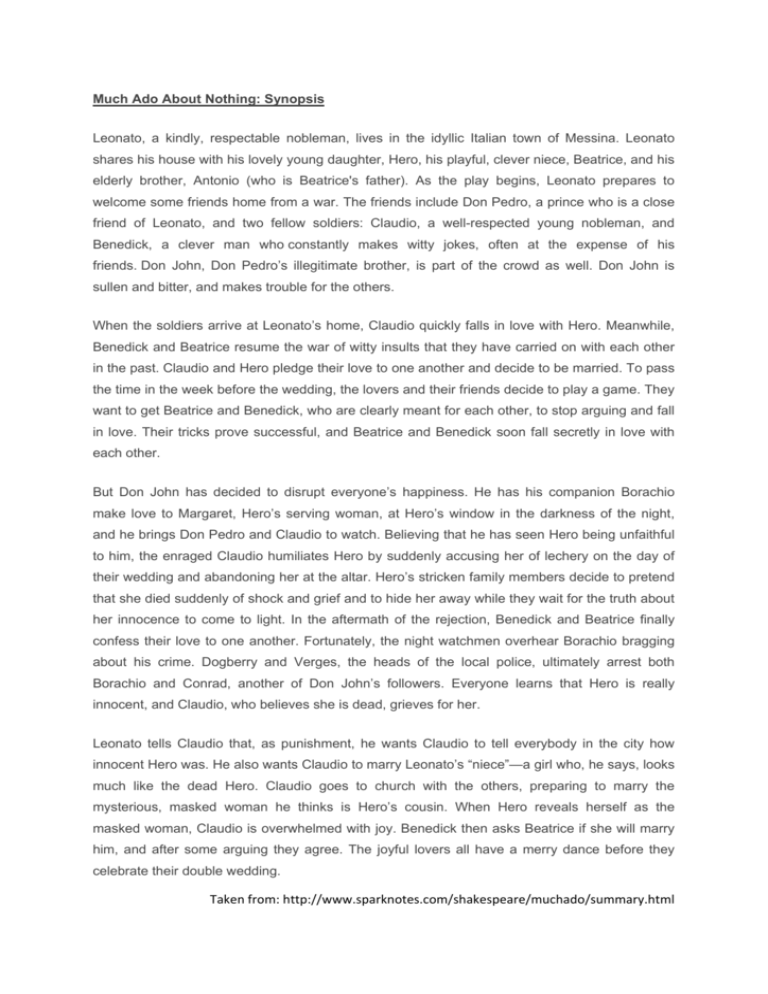
Much Ado About Nothing: Synopsis Leonato, a kindly, respectable nobleman, lives in the idyllic Italian town of Messina. Leonato shares his house with his lovely young daughter, Hero, his playful, clever niece, Beatrice, and his elderly brother, Antonio (who is Beatrice's father). As the play begins, Leonato prepares to welcome some friends home from a war. The friends include Don Pedro, a prince who is a close friend of Leonato, and two fellow soldiers: Claudio, a well-respected young nobleman, and Benedick, a clever man who constantly makes witty jokes, often at the expense of his friends. Don John, Don Pedro’s illegitimate brother, is part of the crowd as well. Don John is sullen and bitter, and makes trouble for the others. When the soldiers arrive at Leonato’s home, Claudio quickly falls in love with Hero. Meanwhile, Benedick and Beatrice resume the war of witty insults that they have carried on with each other in the past. Claudio and Hero pledge their love to one another and decide to be married. To pass the time in the week before the wedding, the lovers and their friends decide to play a game. They want to get Beatrice and Benedick, who are clearly meant for each other, to stop arguing and fall in love. Their tricks prove successful, and Beatrice and Benedick soon fall secretly in love with each other. But Don John has decided to disrupt everyone’s happiness. He has his companion Borachio make love to Margaret, Hero’s serving woman, at Hero’s window in the darkness of the night, and he brings Don Pedro and Claudio to watch. Believing that he has seen Hero being unfaithful to him, the enraged Claudio humiliates Hero by suddenly accusing her of lechery on the day of their wedding and abandoning her at the altar. Hero’s stricken family members decide to pretend that she died suddenly of shock and grief and to hide her away while they wait for the truth about her innocence to come to light. In the aftermath of the rejection, Benedick and Beatrice finally confess their love to one another. Fortunately, the night watchmen overhear Borachio bragging about his crime. Dogberry and Verges, the heads of the local police, ultimately arrest both Borachio and Conrad, another of Don John’s followers. Everyone learns that Hero is really innocent, and Claudio, who believes she is dead, grieves for her. Leonato tells Claudio that, as punishment, he wants Claudio to tell everybody in the city how innocent Hero was. He also wants Claudio to marry Leonato’s “niece”—a girl who, he says, looks much like the dead Hero. Claudio goes to church with the others, preparing to marry the mysterious, masked woman he thinks is Hero’s cousin. When Hero reveals herself as the masked woman, Claudio is overwhelmed with joy. Benedick then asks Beatrice if she will marry him, and after some arguing they agree. The joyful lovers all have a merry dance before they celebrate their double wedding. Taken from: http://www.sparknotes.com/shakespeare/muchado/summary.html Context Much Ado About Nothing is generally considered one of Shakespeare’s best comedies, because it combines elements of robust hilarity with more serious meditations on honor, shame, and court politics. It was probably written in 1598 and 1599, as Shakespeare was approaching the middle of his career. Like As You Like It and Twelfth Night, Much Ado About Nothing, though interspersed with darker concerns, is a joyful comedy that ends with multiple marriages and no deaths. Although one of the features of Shakespearean comedy is that no one dies, it would be a mistake to assume that death is absent from this genre. Often, Shakespeare’s comedies are more accepting of death than his tragedies, treating death as part of the natural cycle of life. Much Ado About Nothing is no exception, and Hero’s pretending to die of humiliation makes death more vividly present here than in any of Shakespeare’s other comedies. The crisis that lies at the center of Much Ado About Nothing troubles many readers and viewers, since the play creates a very strong sense of anger, betrayal, hatred, grief, and despair among the main characters. Although the crisis ends quickly, Much Ado About Nothing sometimes seems only steps away from becoming a tragedy. Indeed, the line between tragedy and comedy is sometimes fuzzy. Many critics have noted that the plot of Much Ado About Nothing shares significant elements with that of Romeo and Juliet. Much Ado About Nothing also shares many features with Shakespeare’s late play The Winter’s Tale, which most critics assign to a different genre—that of problem comedy or romance. Like Hermione in The Winter’s Tale, Hero stages a false death only to come back to life once her beloved has repented. Although the young lovers Hero and Claudio provide the main impetus for the plot, the courtship between the older, wiser lovers Benedick and Beatrice is what makes Much Ado About Nothing so memorable. Benedick and Beatrice argue with delightful wit, and Shakespeare develops their journey from antagonism to sincere love and affection with a rich sense of humor and compassion. Since Beatrice and Benedick have a history behind them that adds weight to their relationship, they are older and more mature than the typical lovers in Shakespeare’s comedies, though their unhealthy competitiveness reveals them to be childish novices when it comes to love. Taken from: http://www.sparknotes.com/shakespeare/muchado/summary.html

